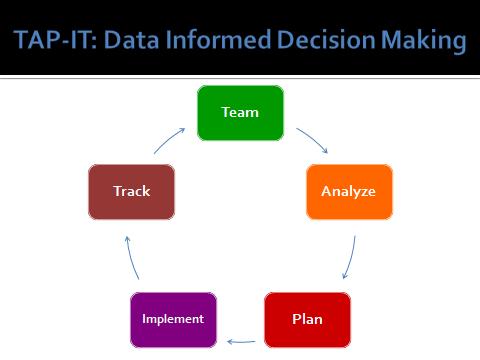Data-Informed Decision Making
Throughout a purpose-driven evaluation and assessment process, are opportunities to utilize data to inform decision making. These include decisions about eligibility, decisions about individualized child and family interventions and supports, and decisions based on child and family outcomes. Think about:
- How is evaluation and/or assessment data utilized to determine eligibility?
- What specific evaluation and/or assessment data informs our response to a child’s strengths and needs?
- What specific evaluation and/or assessment information do we gather to develop functional IFSP outcomes and IEP goals, leading to specific interventions and supports?
- How does evaluation and/or assessment data inform a child’s progress on the three global early childhood outcomes?
Using data systematically to ask questions and obtain insight about a child’s progress provides a step-by-step way to monitor continuous improvement and tailor instruction to meet the individualized needs of children with disabilities and their families. The TAP-IT model of data-informed decision making was created by The Johns Hopkins University, School of Education and The Johns Hopkins University, Center for Technology in Education to improve results for students with disabilities. In the TAP-IT process a team (family and/or caregiver, service provider(s), teacher, service coordinator) works collaboratively to analyze all evaluation and assessment data sources, to plan interventions/supports for a child and/or family through an IFSP or IEP, to implement the IFSP/IEP interventions and supports and then to track its impact.

Team – The team works collaboratively to identify sources of relevant data (i.e., initial and ongoing evaluation and assessment data) in order to ask the right questions.
Analyze – Team members identify specific interventions, strategies, services and/or supports for the child and/or family. Specific interventions, strategies and/or services are shared and discussed.
Plan – Team members identify individual children and/or families who may benefit from specific interventions, strategies, services and/or supports. Specific interventions, strategies and/or services are shared and discussed.
Implement – Team members implement a specific intervention/strategy with fidelity.
Track – Team members meet regularly to review various data sources (observations, photos, videos, work samples, parent input, formal assessment results, IFSP/IEP present levels of development and functional performance, progress on IFSP outcomes and IEP goals, Child Outcomes Summary data, Work Sampling System/EC-CAS data, etc.) to monitor impact and results.
The five-step TAP-IT data-informed decision making process is designed to promote the on-going use of data to guide inquiry, to inform the use of evidence-based practices, and to monitor continuous progress. Gathering and synthesizing initial and ongoing evaluation and assessment information utilizing the TAP-IT process will guide the team toward effect data-informed decisions to promote school readiness for young children with disabilities and their families.

